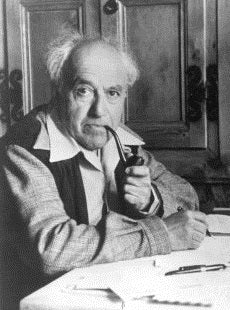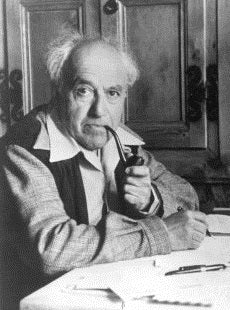 On July 24th, we will celebrate the 138th birthday of Swiss composer Ernest Bloch! Bloch was a violinist from the age of nine, studying in Brussels with teachers such as Eugène Ysaÿe. Soon after, he began his composition studies and published his first work, Historiettes au Crépuscule for mezzo-soprano voice and piano, in 1903. However, he soon found that his Jewish roots distinctively resonated within him in his musical endeavors. Bloch composed a number of works that have come to be known as his “Jewish Cycle”. These pieces now constitute some of his most well-known works since these compositions contain tremendous forces of expression and personal significance. Bloch admitted, at one point, that he could not distinguish within his music where his Jewish influences ended and where his self began.
On July 24th, we will celebrate the 138th birthday of Swiss composer Ernest Bloch! Bloch was a violinist from the age of nine, studying in Brussels with teachers such as Eugène Ysaÿe. Soon after, he began his composition studies and published his first work, Historiettes au Crépuscule for mezzo-soprano voice and piano, in 1903. However, he soon found that his Jewish roots distinctively resonated within him in his musical endeavors. Bloch composed a number of works that have come to be known as his “Jewish Cycle”. These pieces now constitute some of his most well-known works since these compositions contain tremendous forces of expression and personal significance. Bloch admitted, at one point, that he could not distinguish within his music where his Jewish influences ended and where his self began.
During the outbreak of World War I, Bloch sought solace in the Bible; particularly, the book of Ecclesiastes. The text from Ecclesiastes 1:2-9, which brought him significant inspiration, was originally intended to be a composition for voice and orchestra. However, Bloch was not fluent enough in the Hebrew language, and felt it wasn't fitting or effective to set text in a language in which he wasn't proficient. After numerous failed attempts, Bloch finally became inspired by a friend’s melodious cello playing. He found his friend’s playing so intriguing that he then decided to turn his Ecclesiastes inspired piece from voice and piano to cello and piano. “Why not use my Ecclesiastes material, but instead of a human voice, limited by a text, employ an infinitely grander and more profound voice that could speak all languages -- that of his violoncello?” he wrote in the piece’s program notes. The cello plays the role of Solomon, or “Schelomo”, as the Hebrew translation calls him, the rhapsodist of the book of Ecclesiastes. The surrounding world, as well as his inner thoughts, are represented in the orchestra. Since the cello is quite literally his voice, many of the rhythms as well as melodic contour are derived from Hebrew speech.
Included is a spectacular performance by cellist Leonard Rose. Born to Russian immigrant parents, Rose studied from a young age with reputable teachers from the Miami Conservatory, the NBC Symphony Orchestra, and the Curtis Institute of Music. Upon graduating from Curtis, he played in the NBC Symphony and was then promoted to principal cellist of the Cleveland Symphony, and eventually principal of the New York Philharmonic. In 1946, he joined the faculty at the Juilliard School. He went on to pursue a career in teaching and performing, and taught many of today's finest cellists, such as Yo-Yo Ma. To this day, his personal music library can be found within the Juilliard walls. Juilliard also has a scholarship in his honor which is extended to its cello students; this final wish was made by Rose toward the end of his life.



1 comment
Who wrote this article?
Leave a comment